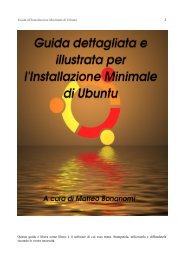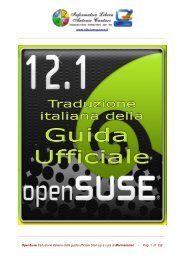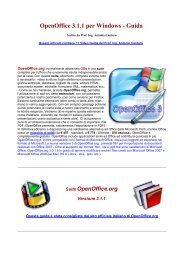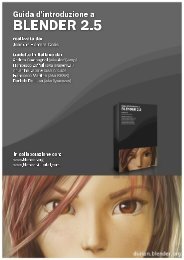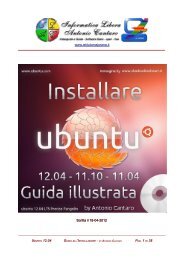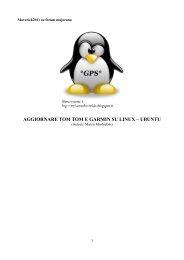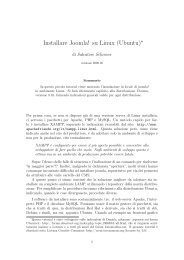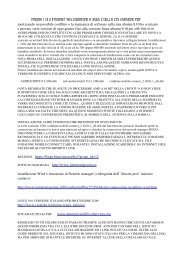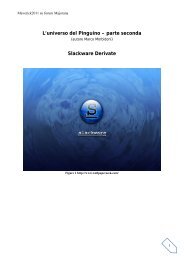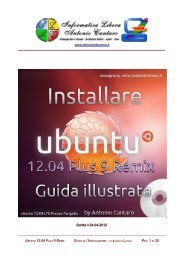Create successful ePaper yourself
Turn your PDF publications into a flip-book with our unique Google optimized e-Paper software.
Di G. Mazzone e P.R<br />
<strong>Rivista</strong> Tecnica nº 8<br />
Anno 2011<br />
I motivate n° 3 - Tuneless of the viruses in the computer<br />
Dimenticati dei virus<br />
Se il computer si spegne senza chiederlo, se<br />
appaiono strane finestre con testo incomprensibile, se<br />
si verificano altre diavolerie senza che tu lo chieda, se<br />
delle e-mail vengono inviate agli indirizzi della rubrica<br />
a tua insaputa, allora il tuo computer ha,<br />
probabilmente, contratto un virus o del "malware". Il<br />
motivo principale per cui accade sta nel fatto che usi<br />
Windows.<br />
Linux difficilmente contrae dei virus. Certamente non è<br />
proprio impossibile prenderne uno. Ad ogni modo,<br />
Linux fa in modo che questo accada molto<br />
difficilmente. Di seguito elenchiamo alcuni motivi.<br />
Moltissima gente usa Microsoft Windows e i<br />
malintenzionati vogliono creare quanti più danni (o<br />
controlli) possibili, quindi mirano a Windows. Molti<br />
virus ed infezioni varie, sono costituite da programmini<br />
eseguibili (exe) o ActiveX o similari che, all'interno di<br />
Windows, sono una grave minaccia, mentre in Linux<br />
sono come l'acqua minerale in quanto non vengono<br />
neppure riconosciuti, restano dei file morti ed<br />
inutilizzabili.<br />
Linux usa un controllo delle autorizzazioni intelligente,<br />
mentre, sotto Windows, tu ed ogni programma che<br />
installi, avete spesso i privilegi di fare quasi tutto<br />
all'interno del "sistema" (computer). Se vuoi andare<br />
nelle cartelle di "sistema" e cancellare qualsiasi cosa,<br />
Windows non avrà nulla in contrario. Ovviamente, al<br />
riavvio successivo, cominceranno i problemi. Ma stai<br />
sicuro che se tu puoi cancellare i file di sistema, anche<br />
altri programmi possono fare questo ed altro, sia che<br />
già siano annidati nel computer, sia che provengano<br />
dalla rete (internet). Linux non lo ammette, infatti, ogni<br />
volta che vuoi fare qualcosa che incide sul sistema, ti<br />
viene richiesta la password di amministratore. Se non<br />
sei "amministratore del sistema", non puoi farlo. I<br />
virus, quindi, non possono gironzolare e cancellare o<br />
modificare il sistema, infatti, non hanno<br />
l'autorizzazione (password) per farlo.<br />
Forgot the viruses<br />
If the computer switched off itself without our request, if<br />
strange windows appear with ian ncomprehensible text, if<br />
other errors occur without our rquest, if some e-mails are<br />
sent to your address book without your knowledge, then<br />
your computer has, probably, received a virus. The main<br />
reason it happens is the use of Windows.<br />
Linux hardly receives some viruses. Certainly it is not<br />
impossible to take one of it. Anyway, Linux makes this<br />
very difficult. Following, some rason is listed.<br />
A lot of people use Microsoft Windows and the malicious<br />
ones want to create more damages (or controls) they<br />
can, therefore they contemplate to Windows. Many<br />
viruses are constituted by executable programs (exe) or<br />
ActiveX or similar that, inside Windows, represent a<br />
serious threat, while in Linux they are as the mineral<br />
water because they are not recognized, they are dead<br />
and unusable files.<br />
Linux uses an intelligent control of the authorizations,<br />
while, under Windows, you and your pograms installed,<br />
has privileges that allow you to do almost verything inside<br />
your "system" (computer). If you want to enter into the<br />
"system" directories and delete everything, Windows<br />
won't have anything against it. Obviously, in the following<br />
reboot, the problems will start. If you can cancel the files<br />
system, also other programs can do that, both that has<br />
already nested in the computer, both that they have ben<br />
originated from the net (internet). Linux doesn't allow it,<br />
every time you like to do something that impacts on the<br />
system, the administrator password is rquested. If you are<br />
not "system administrator", you cannot do it. The viruses,<br />
therefore, cannot stroll about and to cancel or to modify<br />
the system, they don't have the authorization (password)<br />
to do it.<br />
WWW.MAREASISTEMI.COM mareasistemi@gmail.com<br />
Pag 10



